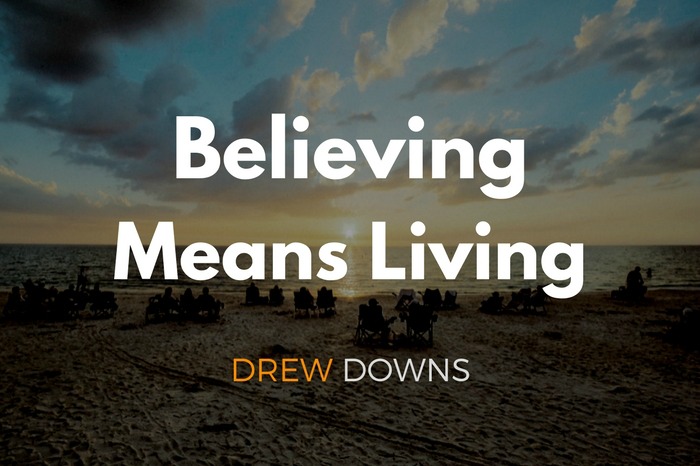24. Christians should be taught that belief unused is unbelief and a damning of God’s generous mercy.
Much of what passes for faith or Christian theology is not a profound truth, but a riddle. We aren’t being honest with each other or ourselves; we’re unwittingly playing a game of deception.
What I mean by riddle is a little mind game which obscures the more direct answer. In other words, it’s usually a linguistic trick.
What’s black and white and read all over?
A newspaper.
Of course you have to hear that one out loud, because it plays off of the homonym red/read.
Our philosophy and theology are built around competing frames for an argument, so we’re not able to handle it directly.
Of course we don’t know we’re doing this. We think we’re being honest. Most of the time we’re honestly trying to figure something out. And we can’t figure out why it doesn’t work.
The best example is the paradox of God’s might.
The classic construction is to ask:
Is it possible for God to make a rock so heavy God can’t lift it?
If you say yes, then you limit God’s strength.
If you say no, then you limit God’s power.
It seems unanswerable when you wrestle with it. But that depends on three things:
- That God is necessarily infinitely strong and powerful
- Strength and power are measured by earthen standards
- God’s strength and power must be put in opposition to each other
Because the way the question is framed pins two concepts against each other. It directs you into an impossible position.
It is a paradox, for sure, but I don’t argue a necessary one. It’s intentional. It has more in common with a riddle than with an honest examination of the nature of God.
The best answer to the question, is such a thing possible is to deal with the underlying question: why are we so afraid of limiting God?
Faith Alone is a riddle
The construction of faith Martin Luther offers us is a riddle. It pits God’s power against human agency. It doesn’t matter that Roman Catholics were being treated like a straw man in the argument half as much as the far greater assault on the more historic belief: God and human agency work together.
And let’s be honest, Luther’s description of God’s grace isn’t exactly free. The fee is repentance. A person does have to do something according to Luther and his many acolytes. Which, I suppose they’d say doesn’t actually count.
We can recognize the shortcomings of a faith built on freely given grace untethered from any expectation on humanity. Greatest among them is
Why do anything good if we’re already forgiven forever?
And we all know predestination is BS.
What this does is it hangs a great deal of IFTTTs (if this therefore thats) on a simple isolated idea:
God does it.
Which is fine as long as everything remains theoretical.
But when it comes to taking responsibility for our actions, protecting the community, or doing literally any of the things Jesus taught, that’s all second order and somehow either preordained (thanks, Calvin) or somehow a reflection of the blessed Christ. Except when we’re jerks. Wait, even then? Shoot!
Justification by faith alone only deals with half the story. It doesn’t deal with the other half. The part where our relationship with Jesus means anything and has any activity to it.
It’s like saying I solved the great mystery of life! Here it is:
2 + =
Believing in grace means living in grace.
Luther only gives us half the equation. The other half is living it out.
We confess of our sin and God gives us mercy.
Yes, that’s totally true. That’s the equation and God does do this as a free act of liberation for us. This is absolutely true.
And
God liberates us to build a better relationship with us, with our world, and with all that is. God liberates us so that we will build a better relationship with one another, our world, and all that is.
This is an action on God’s part which necessitates action on our part. Not because the riddle demands it to be so or because the complex theology dictates it, but because this is also part of the equation.
Because the original equation that Luther narrowed down to personal grace was about humanity’s interdependent relationship with God.
Grace is the manifestation of love for and with humanity as part of our relationship. It’s not a commodity and we don’t need to source its original seller. Grace is the very lifeblood of the blessed community.
God’s mercy is awesome.
What this ultimately means is we have to be better teachers of the gospel. So we stop talking about God’s grace like wish fulfillment and start teaching about the beautiful relationship between God and her community.
The analytical and philosophical Christianity of the Western church is obsessed with belief in God rather than the belief of God. And that distortion leaves us arguing about the nature of God rather than the generous love of God.
Many of our brothers and sisters are gearing up to wage a war of aggression for the defense of Christmas.
That’s an action of a sort, in the literal sense. It’s unrecognizable as building the Kin-dom and sharing the withness of Jesus, however.
God’s mercy is awesome, not only because we don’t deserve it, but because it frees us to love like Christ. It frees us from the shackles of hate and a prison of an angry faith.
God’s awesome mercy isn’t just free. It’s for us to give away.
[This is Thesis #24 of my 31 Theses. To read them all, visit the 31 Theses introduction page.]

